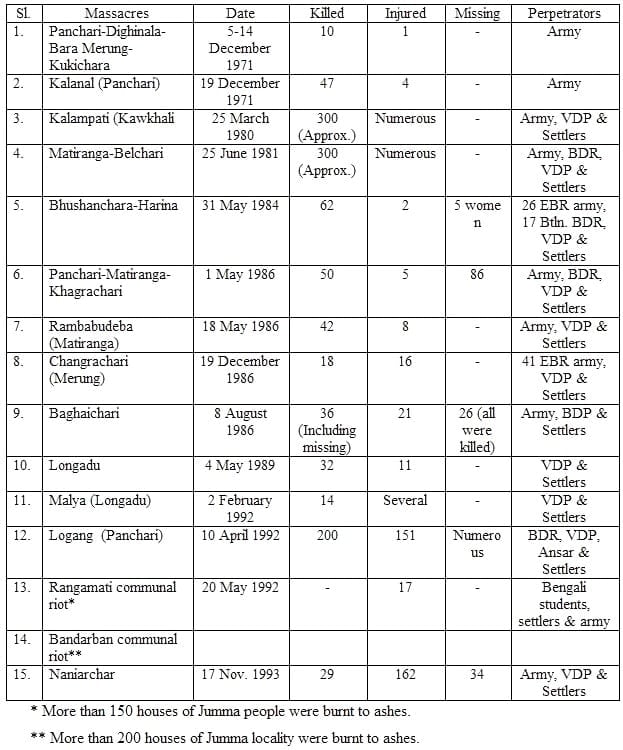Chittagong Hill Tracts (CHT) has also been a victim to suffer inhuman atrocities, killing, raping and looting perpetrated by the Pakistani intruder forces for a period of 9 months till the liberation war came to an end with the surrender of Pakistani General Niazi with a strength of 93,000 of army to the Joint Command Council at Race Course Ground on 16 December 1971. The columns of advancing allied forces and simultaneous retreating of Pakistani army from the theater had been a thrill of joy in every heart of tribal peoples in CHT. But it was no less than ‘a thunder from blue’ when the liberation forces, on their arrival, began to take bath in the blood pool of ethnic indigenous people at the northern CHT. They got involved in indiscriminate killings at Panchari and Kalanal of Chengi valley, at Dighinala, Bara Merung and Kukichara of Maini valley and at Barkal and Jurachari of Karnaphuli valley without having been provoked in any form. The people had no choice to bid them warm welcome as victorious sons of the soil but to flee for their lives. This has been a gesture of advancing liberation forces. Had their wild attempts not been interrupted by the Indo-Tibetan allied forces, claim of lives would have been larger and wider. It was that day’s ‘morning’ that shown the ‘days’ to come.
With the becoming a ‘new nation’ the ‘narrow Bengali nationalism’ turned into an ‘ultra Bengali nationalism’ that soon aroused ‘narrow Jumma nationalism’ in the southeastern hills of the land. Bangabandhu Sheikh Mujibur Rahaman, father of the nation, represented the former sentiment, himself, only to cause M. N. Larma, President of PCJSS to represent the later sentiment in the first ever parliament in 1973. However, it is better to leave for the debaters as to determine ‘what would have happened to CHT for certain if Sheikh Mujubur Rahaman had not been killed in a military ‘coup-de-ta’ on 15 August 1975.
It was the military to open out a new chapter with the generals scrambling for power through coup after coup until General Ziaur Rahaman came to the power as Chief Martial Law Administrator (CMLA) to rule the country for long time through giving birth to a new party named Bangladesh Nationalist Party (BNP) in the cantonment to project him as the President of the Party and to rule the country as a military-turned politician till his brutal killing in a coup by General Manjur during his official visit in Chittagong in 1981. General Zia had unleashed an unequal war against the peoples of CHT. The following heir to the throne was General Hussain Muhammad Ershad who came to power through a coup without bloodshed. But the format of the chess got changed. At certain stage he was overthrown through election. Khaleda Zia, the Chair-person of BNP came to power keeping the army as a shadow government.
The bush warfare that started during General Ziaur Rahaman passed to Khaleda Zia’s government through general Ershad’s period during which he earned a name as a dictator. Hence, CHT had to pass all through these regimes and had to endure inexplicable sufferings including series of genocides, which may better be termed as ethnocide in terms of nature of killings through carrying out communal attacks backed by the army with covering fire at the innocent Jumma civilians. The motive of these crimes is to cleanse out the ethnic indigenous peoples and to occupy their ancestral homesteads and lands fading the barbarity of the days of ‘Doctrine of Discovery’ that had taken place in the history of mankind. The matrix given below is a brief description of massacres taken place since 1971:-


Post-CHT Accord period
However, slight modification was brought in the format by holding general election in 1996. Awami League led by Sheikh Hasina won in the election with simple majority ? a return to power after 21 years of exile. Awami League’s return to power was another new chapter in the history of indigenous peoples’ movement. After holding a series of dialogues ? better known as follow-up dialogues, Hasina government entered upon an accord with PCJSS. The historical CHT Accord, 1997 was signed by Abul Hasnat Abdullah on behalf of the government and Mr. Jyotirindra Bodhipriya Larma, President of PCJSS, on behalf of the indigenous peoples of CHT on 2nd December 1997.
It may be recalled that the army was engaged in unparallel war under the mission called: “Operation Dabanal” (Operation Wildfire). Now, Hasina government replaced it with another mission officially called: “Operation Uttoran” (Operation Upliftment). The post-accord period, in place of prompt implementation of the Accord, has witnessed the state tyranny directing to cleansing out the ethnic indigenous peoples. The chart given below is a brief account of the ill design:

